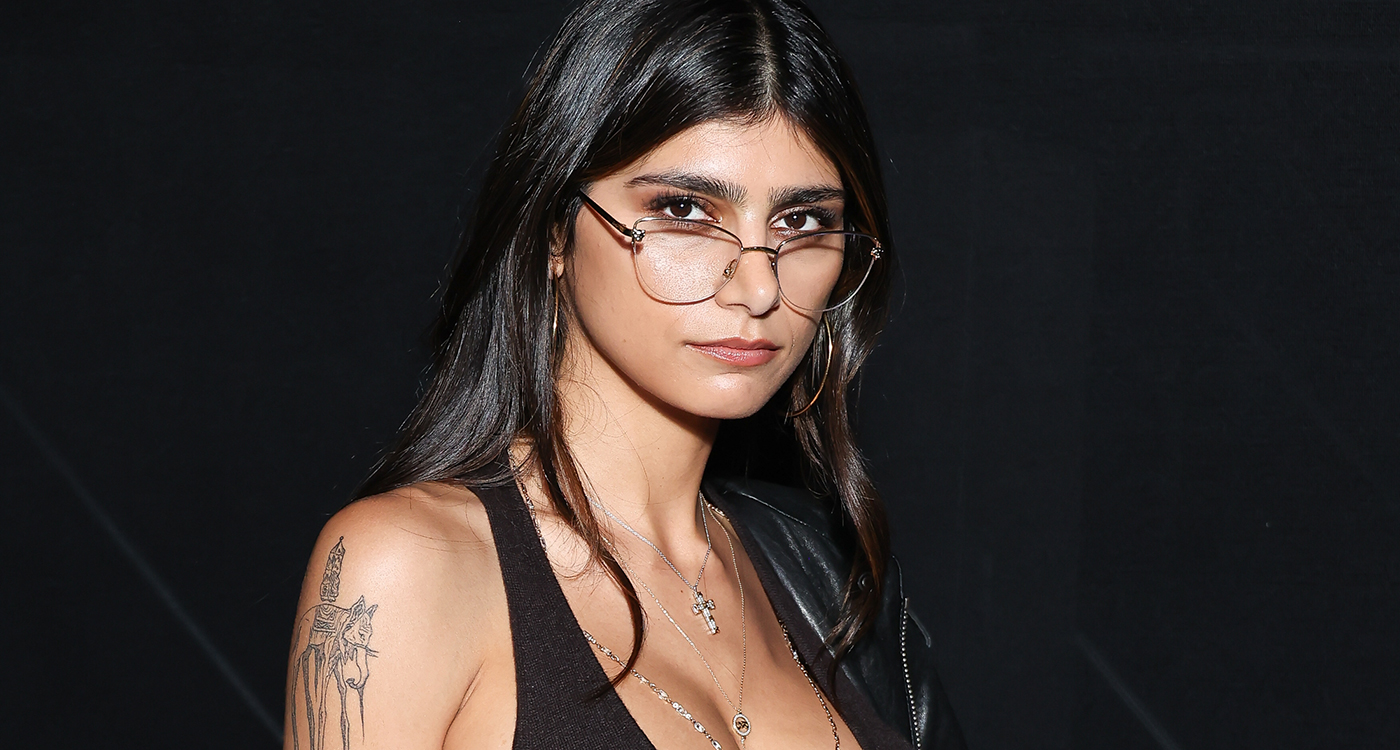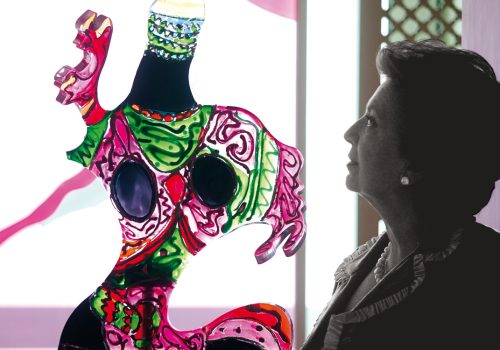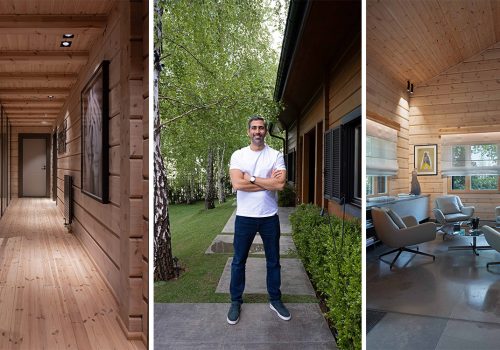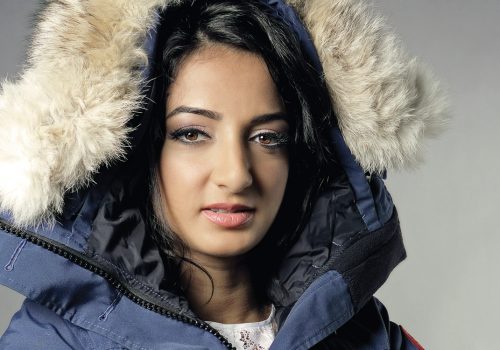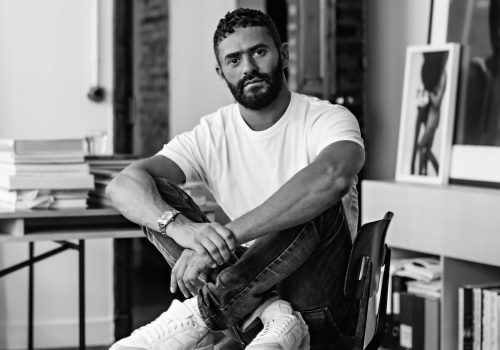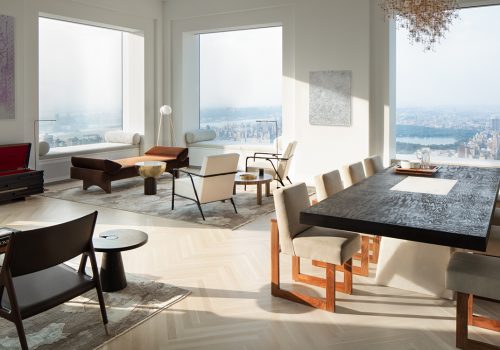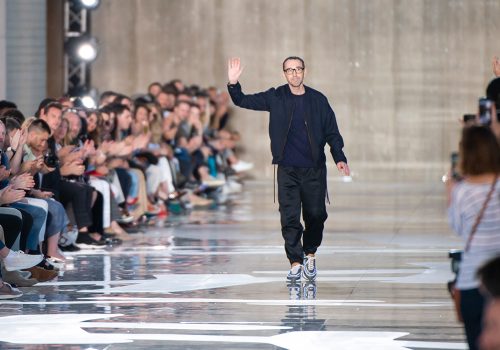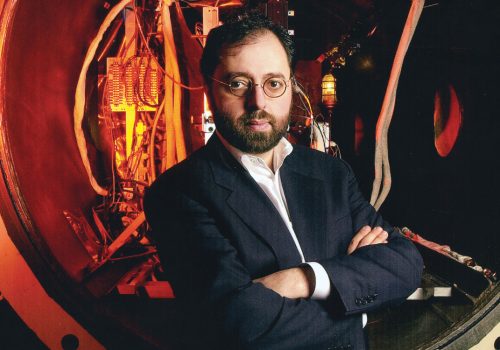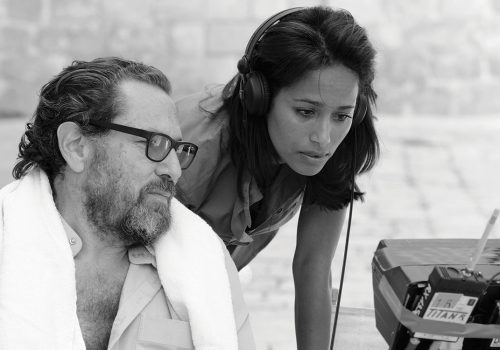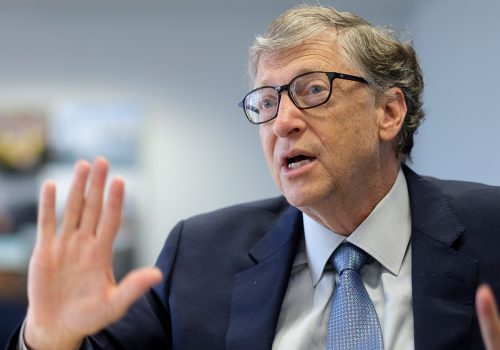Much has been said about the modern day ‘It’ girl. Shorthand for an ineffable aura – one that embodies the cultural zeitgeist and reflects it back to us in sartorial flare and memeable moments – lately it’s become a bit of a misnomer. Probably because the elusive archetype is so hard to articulate. Yet like most things that are impossible to put into words, such as love or a Hans Zimmer score, it’s easy to feel. You’re just drawn to them. Irresistibly so.
Within five minutes of meeting Mia Khalifa, I get why people are so drawn to her. She’s not classically beautiful, but she is highly attractive. She’s no wilting violet either but she’s hardly a vixen. Confident, yet shy. Intelligent, yet unintimidating. You can see why she has almost 28 million followers on Instagram, 5.7 million followers on X (formerly Twitter), and is one of the world’s top TikTok creators. But this isn’t a numbers game. She’s just got it. Not just influence, but substance. The way she carries herself, the way she grabs your attention, the way she pauses before articulating something you’d never have expected her to say. She has it in spades. And, wherever she goes, there’s a trail of light, laughter and – importantly – fashion always follows.
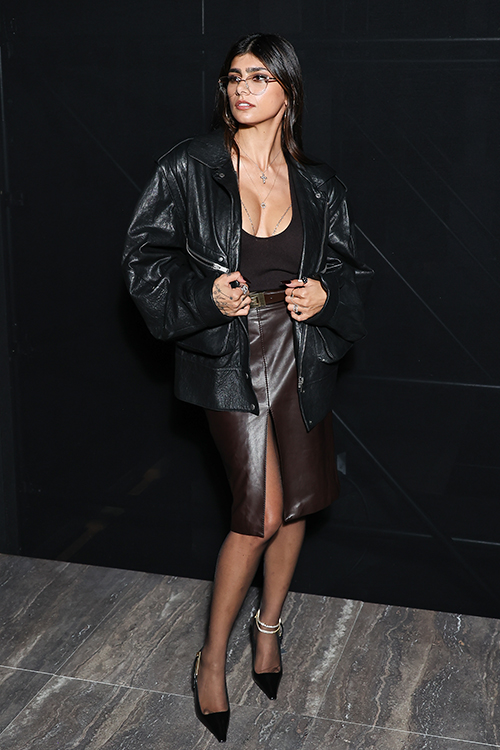
ABOVE: Khalifa is an educated woman who expresses herself with great clarity. When she lived in Beirut, her Catholic parents sent her to a French school. After moving to Maryland in the US, she went to a military boarding school and then university, where she gained a degree in history. “It wasn’t the smartest major, as you don’t get jobs with it and, even if you do, they’re poorly paid,” she told us.
You see, at the start of last year, headlines declared that Khalifa had infiltrated the fashion scene, and it was true, she had, which is quite a feat when you consider what a notoriously gate-kept industry fashion is. Even she – a self-described “realist” – didn’t think she would be a part of it. Yet she is/was. For not only did PR firm Karla Otto name her the Emerging Influencer of 2022, a few months later, data crunching platform Lefty announced that Khalifa created more than 7.6 million USD in earned media value during the AW23 circuit in March, surpassing global stars Zendaya and Kylie Jenner. Moreover, if you were to name any trending Gen Z brand of the moment, from Shoreditch Ski Club to Heaven by Marc Jacobs, chances are they have worked with her, or at least they want(ed) to. By the SS24 collections just a quick glance at her schedule from September 15th to October 3rd proved what a force she had become. For example, after our interview during LFW, she had to rush to a secret-but-exciting appointment in Mayfair. The next night she was invited to the theatre to watch ‘The Effect’ with her new bestie and London’s hottest emerging designer, Dilara Findikoglu. After that it was a – deep breath – front row at Mains (by Skepta) next to Headie One and Leomie Anderson (“I got to give Louis Theroux a personally rolled joint!” she revealed), before closing Knwls for her first-ever runway appearance. There were some other more secret-but-exciting appointments, the GDCS show in Milan and then she popped up at Paris Fashion Week too. Alas her renaissance was curtailed by the fact that, four days after PFW closed, Hamas launched an offensive against Israel and the 30-year-old decided to fire off a series of supportive tweets “for the freedom fighters,” as she put it. Playboy accused her of ‘hate speech’ and booted her off its Centerfold platform, which allows models to interact directly with fans. And then her podcast deal with Canada-based podcaster Todd Shapiro got cancelled too.
Khalifa, as always, has no regrets and refuses to back down. “I’d say supporting Palestine has lost me business opportunities, but I’m more angry at myself for not checking whether or not I was entering into business with Zionists. My bad. I stand with all people fighting oppression, now and always.”
In a way, it just shows how little we really know about Khalifa and how easy it is to misjudge her. Amazingly, she has always managed to claw back the narrative. “My story is not special, it’s just in the spotlight,” she adds. “Way too many women can relate to low self-esteem and to making choices based on seeking validation.”
If you don’t know what she’s talking about, well, that’s a good thing. And it’s a testament to how well she has reshaped her narrative, a mission she’s been on ever since that infamous BBC Hard Talk interview in 2019. Now viewed more than 17 million times, it was the first time many had heard from the former most-watched performer on Pornhub – and she was here to bring them down. Despite being in the industry for a mere three months between the end of 2014 and the beginning of 2015, the eleven videos she made were viewed a billion times. In one, she was famously told to wear a hijab, with the controversial scene evoking global outrage and a multitude of death threats. Isis photoshopped a picture of her being beheaded and uploaded it (to which she replied on Twitter: “Better my head than my tits, they were more expensive.”) While her birth country of Lebanon verbally banned her from ever coming back (despite that, she still donated more than 100,000 USD in 2020 following the August 4th Beirut Port explosion).
After the uproar she deactivated all her accounts, left the industry, and took up a job as a paralegal and bookkeeper. She gradually reopened her social media in 2016 and began posting sports commentary and non-nude photo shoots. Yet, by December 2018 she remained the top-ranked performer on Pornhub. Most of the views came from the same countries condemning her, a hypocrisy encapsulated by a line from her cameo in the Hulu comedy ‘Ramy’: “The men who are yelling at me are the same men who are clicking on me.” Worse still, according to her lawyers, the porn company that exploited her made well over 50 million USD from her content. She, on the other hand, made just 11,000 USD from it, and that was pre-tax.
When Khalifa joined TikTok in 2020 she found, for the first time, a completely new audience – women. People started to understand how one misstep can dump you in a firestorm of misogyny, and how the loudest haters are usually the ones covering up their own abuses. As she continued to share her side of the story, an online petition pushing for the videos to be taken down and fairly discussed in court gained more than 1.8 million signatures. Still, it is a conversation she is unwittingly dragged into even to this day. “I’m trending on Twitter as we speak right now. The discourse is about me walking the Knwls show and people rehashing all of that, ‘Oh but she sexualised hijabs.’”
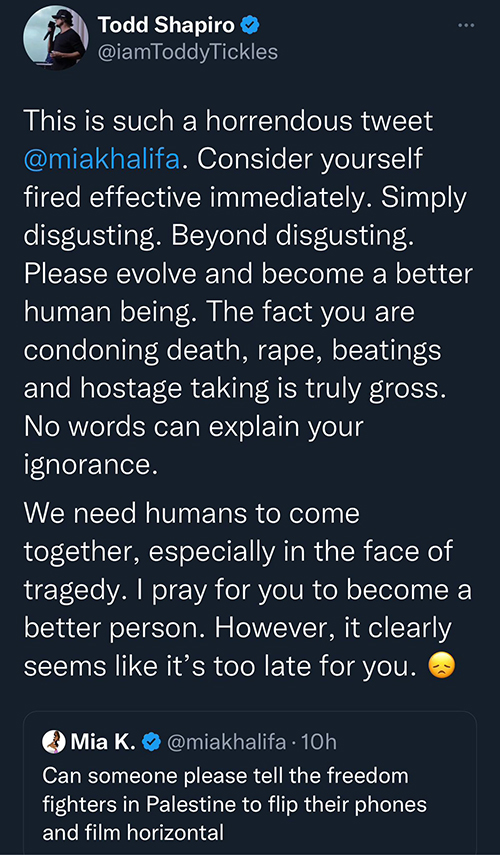 Luckily the dialogue sounds a little different now. “Even now there’s people who are like, ‘You do realise that all these videos are still being made, the production company that writes them, profits off them, is still doing all of this and has never stopped. She did not invent this, she did not sexualise the hijab,”’ she continues about the current X discourse. “Why am I the scapegoat? And why are we not holding the actual corporations that are making this happen accountable? Because now that I’m gone, they’re using Latin women who could pass as Arab and putting a headscarf on them.” She pauses, collects herself, and states, “As for people being incensed by my pro-Palestine tweets, I mean I’m from Lebanon, you’d have to be insane if you actually expected me to be on the side of colonialism?”
Luckily the dialogue sounds a little different now. “Even now there’s people who are like, ‘You do realise that all these videos are still being made, the production company that writes them, profits off them, is still doing all of this and has never stopped. She did not invent this, she did not sexualise the hijab,”’ she continues about the current X discourse. “Why am I the scapegoat? And why are we not holding the actual corporations that are making this happen accountable? Because now that I’m gone, they’re using Latin women who could pass as Arab and putting a headscarf on them.” She pauses, collects herself, and states, “As for people being incensed by my pro-Palestine tweets, I mean I’m from Lebanon, you’d have to be insane if you actually expected me to be on the side of colonialism?”
Shame derives its power from being unspeakable, which is why Khalifa refuses to be silent, even on hot topics. After all, she even auctioned her infamous glasses from many of her videos (and birthed the ‘Are you even a brown girl with glasses if you haven’t been called Mia Khalifa’ idiom) for more than 100,000 USD, donating all of it to charity. Listed as ‘Used and abused’, it is just one of many examples of how she uses humour to refute the power dynamics of shame. “I think if I didn’t have an arguably successful career, I would just be a full-time internet troll with an anonymous X account,” she continues as we laugh over her ‘genocidal daddy’ spam comments on the former Lebanese president’s Instagram account (he’s had her blocked since 2020).
Born in Beirut and moving aged eight to Washington, DC, in 2001 due to ongoing conflict in her home country, Khalifa has always been outspoken about injustices. However, she admits that her confidence and unshakeable self-esteem is a work-in-progress. That’s where therapy has come in. “Take pride in things that make you unique,” she says on some of her biggest therapy takeaways. “It’s not anything that has to do with physicality. It’s not anything that has to do with success. It’s not anything that’s traditionally measured like that. It’s the things that your best friend loves you for.” For Khalifa this looks like building a fire to keep her friends warm, or channelling her love for jewellery into her brand, Sheytan, which, as most of you would know, means ‘devil’ in Arabic. “I had a bunch of Arabic words written out phonetically in English and Sheytan was one of them. It was my favourite because I just felt like that it’s exactly what a girl who might show a little midriff and wear a belly chain would be called by some misogynistic Arab man.” She asked a couple of Arab friends how they would feel about it: “They were like, ‘Yes, this is reclamation.’”
Her real name is Sarah Joe Chamoun and she made up her stage name based on a combo of her dog’s name, Mia, and her favourite weed strain, Khalifa. “I’ll be damned if I give that predatory porn company one more thing,” she says on her decision to continue going by Mia Khalifa. “I am going to reclaim something and make it my own because from the very beginning they didn’t want me to use that name, as they didn’t think people would be able to spell it. Let’s just say they don’t have trouble spelling it now.” But when you’re on top of the world, where do you go next? “I hope that I can get into broadcasts, I hope that I can get into scripted. I hope that I can get into unscripted,” she says. “I want to do anything and everything that I’m interested in because I have that autonomy. “Why not?”
PHOTOGRAPHY: MARC PIASECKI


